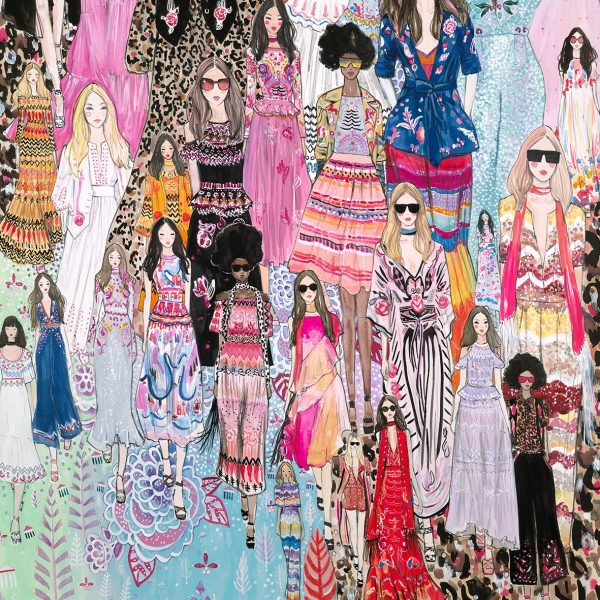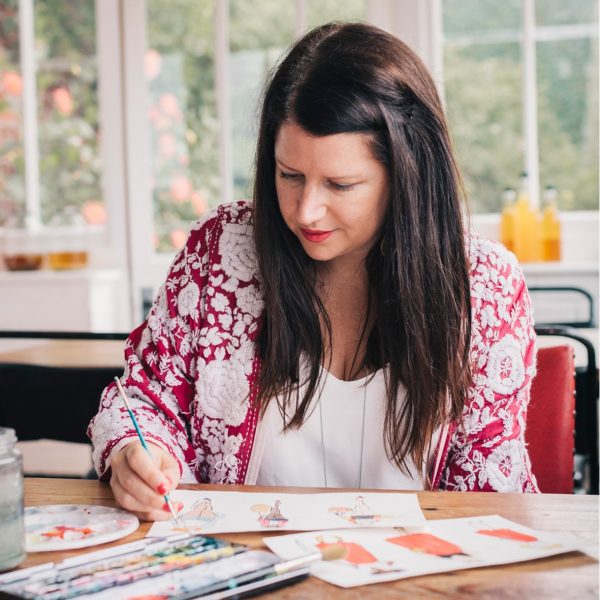Business Insights: Niki Groom
Can you tell us a bit about yourself?
I’m Niki Groom (@miss_magpie_spy) and I’m an illustrator based in Bristol. I studied BA Fashion Design and was a designer for over 15 years before becoming a full-time illustrator 3 years ago (I did both alongside each other for a couple of years). Due to my background I work mainly in fashion and beauty, for brands such as Clinique, Molton Brown, Accessorize and Boden.
I’ve worked on packaging, window displays, social media campaigns and also, I illustrate live at events as part of LIL Collective.
Recent personal projects that have involved travel and reportage are starting to pay off – I’m speaking to hotel groups and charities at the moment.
“I work traditionally. I know there’s lots of work in digital illustration but it’s not where my passion is, so I continue to develop my hand rendered work”.
You are doing some work as an influencer. How are you managing this?
I really enjoy social media, especially Instagram and Twitter, and I like to stay on top of what is happening and see the opportunity in that. Recently I’ve found there’s quite an overlap with being a creative and being seen to have influence, so as my following has grown I have seen potential for new ways of earning money.
I decided a couple of years ago I wanted to be creating more diverse fashion imagery, and so I started a blog where I illustrate the same outfit on 3 different women and show it photographed on me. That led on to some sponsored posts from brands such as Fat Face and Onjenu, and in turn led on to further work with Fat Face.
And now I’m working with a hotel I stay in in London, where I illustrate for them but also share the work in progress and other snippets from the hotel on my Instagram Stories.
With influencer work that uses any of my illustration work I still send them an AOI acceptance of commission form detailing usage and quote for the work. I make a clear distinction between my influencer work and illustration work when putting forward a quote, and make sure I quote separately for all elements.
“What I’d say to watch out for is a casual request to share something on your stories tagging the client, as this is then great content they can push out to their followers. Make sure you quote for that”.
How do you approach negotiating with clients?
I’m always professional with my emails to clients. If someone approaches me in a casual way on Instagram DM I’ll ask for their email address. Keeping track on Instagram is hard, I would never talk business there.
If someone is really chatty in their initial email I won’t respond like that, I keep it friendly but short and sweet and informative.
I have on occasion agreed to a slightly reduced fee to fit a budget with a repeat client, but in the same email I have written that next time the work will need to be at my full fee. I think this is good practise.
“I’ve recently increased my fees as they had been the same for years and I’m not having any push back from that. The key is to keep it professional, you don’t need to explain why you are increasing your fees. People in jobs get pay rises, you deserve one too”.
I think the main thing is to strip emotion from your emails. Reread them before you send them. It’s great to write that you are excited about the project and looking forward to working with the team, but outside of that it’s not necessary I don’t think.

You are very accomplished at seeing your work as a business – what are some of the most important ways you achieve this?
Due to my fashion design background I learnt a lot about business. Fashion for me is about sales, budgets, trends, fast turnarounds, people changing their minds, understanding the needs of the customer and the need for great communication. I see illustration in the same way. As a result, I don’t often take things personally. Yes, I get frustrated at times but I then have private conversations with fellow illustrator friends about specifics.
I take to twitter to talk openly about general problems (working for free, copyright infringement etc) as believe that helps other people too. But I really see that I have a brand and am running a business so I take it seriously; I need it to succeed.
This ability to see myself clearly as a business might be helped by the fact that Miss Magpie Fashion Spy was originally a trend website that I set up. In it I did fashion reports from overseas cities and I’d illustrate key looks. That business didn’t take off but the illustration side did – so I used all of those social media handles. And so, it’s a very clean split between Miss Magpie and Niki Groom. I don’t think a pseudonym is necessary at all, but it works ok for me.
Other key things I think are having a business bank account; taking admin seriously (I do it in a different place to my artwork so that I’m focused) and realising when you share something somewhere that a commissioner could be looking.
“It’s important to take time to be really creative, to try new things and to take risks. That’s an investment in your business”.
Freelance income can be precarious. How do you manage your finances?
I think people are prone to undercharging. I know after 3 years full time that I only have time to do about 10-12 days a month of paid work, due to updating website / social media / approaching clients / promotion / finances / learning / personal projects / holiday / sick days on the other days.
So, say that’s 130 days per year of paid work. I want to be earning about £45k per year so that means I need to make sure I’m earning money that works out to around £350 per day. As soon as you start accepting work for £100 that will take you a couple of days you are looking at earning £6.5k a year. I don’t ever charge a day rate as I charge a license fee, but it’s good to do a sense check sometimes.
However sometimes it just doesn’t work out. In 2017 I had a bad year, I earnt about £23k. I am single and have a mortgage and no money to fall back on, and so it was very stressful. As a result of this I saw a financial advisor and he helped me work out a plan for the future. I now drip feed a little bit in to an ISA, and I have critical illness insurance in case I get sick.
I shared a lot of this info on Twitter and as a result got paid to write an article for Moneywise magazine, you can read it here https://www.moneywise.co.uk/work-family/family-life/my-money-lessons-freelance-illustrator-shares-her-story
It’s possible to be well paid though as an illustrator and I don’t think people talk about that enough. In 2017 I took £23k but in 2018 I took £65k.
That’s an amazing amount I think, but it’s important to understand that that isn’t profit. Once I’ve done my accounts and have taken out studio rent, production, website costs, postage, art equipment and travel the end figure will be less. And then you pay tax on that. And I’m a limited company so my accountancy per year is around £1000. I’ve paid off my debt and my tax savings are out of the way, but I’m still cautious about spending too much because I know it ebbs and flows.
How do you look after your wellbeing?
If I’m honest I think time management comes naturally to me. I’ve never missed a deadline, I’m always realistic with how long things will take. I will go straight to the client though and tell them if the deadline they are quoting isn’t achievable for me, that’s fine and they always appreciate knowing that at the start. I do think this is easier for me though because I don’t have kids, I’m able to work all hours if needs be to make something happen.
Taking time out is not something I’m great at. Last year I worked so hard due to the poor year before, and took on a lot of event work. Much of this was in London but some was overseas and there was so much travel. In December I could feel something was up, so when there was a gap in my schedule I took myself away to Cornwall, switched off my phone and put an out of office on for a week.
As a result of that I’m trying not to overcommit this year. And I’m making sure I exercise and eat healthily. Being a hermit and surviving on toast isn’t a good look.
Top 3 tips for your peers
“Interact with people online whose work you love, it’s great to be part of a community and the Illustration community is especially friendly”.
I don’t offer discounts to friends and family unless the project would be great and new for me. Many people don’t understand the value of artwork but you should.
If you want to offer a % discount then show on the invoice what they should have paid and what they did pay after discount.
Make sure your personal projects are pushing you on and you aren’t just doing more of the same work. Brands are often looking for something new, make sure you are offering that so they don’t have to go elsewhere.
@miss_magpie_spy (twitter and instagram)
Back to News Page

